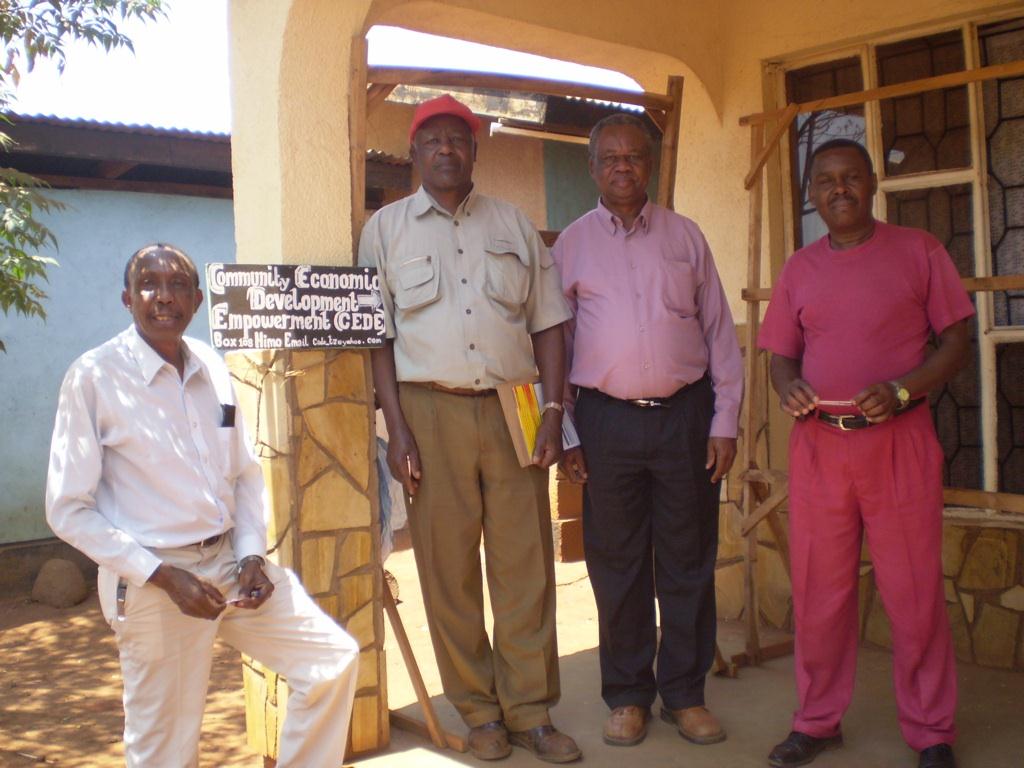
CEDE (Community Economic Development Empowerment) is a non-governmental organization founded in February 2008 by a group of people concerned with the wellbeing of the community. The group includes conservationists, traditional community elders, civil servants and the disadvantaged people within the society.
CEDE is a local NGO based in Kilimanjaro region specifically dealing with sustainable economic development and improving the livelihoods of Kilimanjaro society, i.e youth, women, vulnerable and management of the environment.
Nowhere are the effects of global warming more evident than in this region as we stand witness to the disappearance of the ice cap at Mount Kilimanjaro. In addition to this, rural communities testify not only to noticing changes in weather patterns in recent years but in also physically observing the loss of biodiversity in the ecosystem, degradation of topsoil, extinction of certain natural resources -though seemingly simple have sustained generations. These problems continue to negatively impacts on the communities well being and are, in themselves, a cause of poverty.
At the roots of these problems lie social and economic drives and thus there is need to appreciate the human dimensions or socio-economic aspects that are linked with these changes such as population growth, environmental degradation perpetuated by the unabated deforestation and over cultivation, soil infertility as a result of continued crop cultivation without replenishing with fertilizers and manures, leading to crop failures and poor yield which corresponds to nutritional problems.
Through a shared vision of improving the livelihood of the rural populace, it is obvious that our environment has to be improved so as to maintain the natural status of our planet suitable for a balanced biodiversity which will facilitate improved crop and livestock production patterns.
For this reason a special focus on human interactions to the environment must be enforced so as to attain the desired goal.
Our first challenge remains to bring to light the plight of the Kilimanjaro region; establishing and strengthening community awareness on environment conservation; global warming; and climate change.
CEDE is committed to the wellbeing of the community by promoting the economically and socially responsible use of our natural resources and working to ensure a sustainable economic growth of our community through embarking on trainings, seminars and participatory action research.
In this strategic plan CEDE identified priority areas and these are; the urgent need of involving the community in identifying development blockages and look for the means of rectifying them, the need to develop adaptive capacity to effectively respond challenges for the future by prioritizing strategies that will address associated vulnerabilities and instigation of project activities in responses to current and emerging community development issues pliability.
CEDE recognizes that entrepreneurship knowledge, vulnerability and resilience to economic development externalities are embedded in societies and cultures, thus we seeks to fully involve the general public in the production process, from the initial point of production plan.
Consequently the focus of CEDE is on empowering communities through education, communication to take corrective action and sensitization on the need for greater integration of economic development concerns by strengthening advocacy on the issue. Communities need to be well informed and aware about the many environmental, social, cultural, economic, and political phenomena that affect their life and the many ways in which their own actions affect their local economic environment.
CEDE intends to utilize participatory field research that will be centered around a critical analysis of existing initiatives and identifying sustainable practices and concrete initiatives to develop participatory insights into what a community knows and to ascertain indigenous knowledge and expertise in the management of natural resources for sustainable economic development, what challenges they face, and what opportunities are available for development. This undertaking is oriented towards community empowerment and generating data for advocacy and the planning process based on priorities expressed by stakeholders
CEDE also recognizes the fact that women represents an immense source of potential and power to combat the increased house hold poverty. CEDE poses and will therefore place emphases on building women’s knowledge and capacity for the production process. CEDE seeks to increase women’s participation in community decision making processes.
In this strategic plan networking will be adopted as the main strategy to the holistic methodology all appropriate measures will be taken to ensure strong alliances among both like-minded NGOs and other partners in the public and private sector in order to find the expertise elsewhere if needed.
CEDE is working towards proactively building adaptive capacity to respond to climate changes, ensure maximum productivity of livelihoods while at the same time maximizing the ecological sustainability and conservation of the Kilimanjaro region and in turn generate global environmental benefits and increase resilience in the face of climate change impacts.

CEDE is a non-governmental organization registered under the NGO ordinance and with a registration certificate No. OONGO/O 405 issued on 25th August 2008.
The organization founded in February 2008 by the Board members who have seen the dangers of increased house hold poverty in the Region and in Tanzania as a whole is currently in the process of organizing to mobilize funds for its future operations. The areas of operation of CEDE will include East and West Divisions of Moshi rural Districts in Kilimanjaro region.
CEDE are seeking academic or skilled volunteers and interns who would help them research into any of these topics or any other topic that might assist them.
